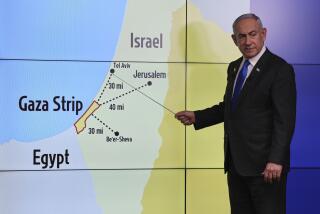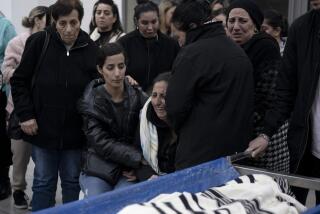Israel Is Warned on Annexing Land
- Share via
JERUSALEM — Palestinian Authority Prime Minister Ahmed Korei issued a sharp message Thursday to Israeli Prime Minister Ariel Sharon, warning him against trying to draw the borders of a Palestinian state without negotiations.
“The conflict would continue, the fires would burn, terror would increase, and no one would gain,” Korei told the mass-circulation Israeli newspaper Maariv, in his first response to Sharon’s informal proposals for a unilateral Israeli pullback from parts of the West Bank and Gaza Strip.
“It would be a bad mistake to force a settlement on us,” Korei said. “We would not accept it. The world would not accept it.”
In the interview, he also denounced the Israeli security barrier being constructed around the West Bank, which cuts deep into territory claimed by the Palestinians. His position was a familiar one, but the language was harsher than any the Palestinian prime minister had previously employed publicly.
“You cannot build a fence on our land, put us into coops like chickens and hope for the best,” Korei said. “It will cause a disaster.”
Sharon has been dropping increasingly broad hints that if efforts to revive peace talks with the Palestinians fail, he would consider uprooting Jewish settlements in the Gaza Strip and parts of the West Bank -- steps that Israeli leftists have advocated for years.
But as envisioned by Sharon, such a plan might also involve annexing chunks of the West Bank and, in effect, imposing borders that Palestinians would find unacceptable. Palestinians fear that Israel might use the route of the security fence as a demarcation line for their future state -- one of their chief reasons for opposing the barrier’s route.
“If you want a fence, fine. Build it on the Green Line,” said Korei, referring to the frontier between Israel and the Jordanian-controlled West Bank before the 1967 Middle East War.
He added sardonically: “In that case, we would be prepared to share the construction costs with you.”
But in a reminder of the intimacy of the conflict here, the Palestinian prime minister also spoke of Sharon as a man he knew well from informal negotiating sessions in years past, before either took office. Some of those talks were held at the Israeli prime minister’s sheep ranch in the Negev desert, and Korei reminisced fondly about the culinary skills of Sharon’s late wife, Lily, who died of cancer three years ago.
In contrast with his predecessor, Mahmoud Abbas, who moved to hold talks with Sharon in June almost as soon as he was sworn in, Korei has taken a much more hard-edged approach, saying he will meet with the Israeli leader only if it is clear that Palestinians have something to gain by such discussions.
In the Gaza Strip, meanwhile, Israeli troops and Palestinian gunmen fought one of the most concerted firefights of recent months in the volatile southern town of Rafah, along the Egyptian border.
The prolonged exchange of fire, which began before dawn Thursday and continued until midday, left six Palestinians dead and at least 17 injured, according to hospital officials.
Palestinians said that five of the dead, including a medic, were noncombatants, and that the wounded included children.
At one point, the fighting raged in a Muslim graveyard, where Palestinian gunmen took cover among tombstones and fired toward Israeli troops.
The Israeli army said its push into Rafah, using nearly two dozen armored vehicles backed by assault helicopters, was part of an ongoing operation against militant groups such as Hamas and Islamic Jihad.
Israeli military spokesmen said the fighting broke out when troops who had come to arrest a senior member of Islamic Jihad were fired on with antitank missiles and automatic weapons.
The army said it arrested the Islamic Jihad fugitive, Khaled Kadi, and later demolished his family’s house along with two other structures.
Funerals for the victims were held within hours of the fighting, drawing tens of thousands of angry mourners into the winding streets of the Rafah refugee camp.
“Sharon, Sharon, we will dig your grave for you!” the marchers shouted.
More to Read
Sign up for Essential California
The most important California stories and recommendations in your inbox every morning.
You may occasionally receive promotional content from the Los Angeles Times.










